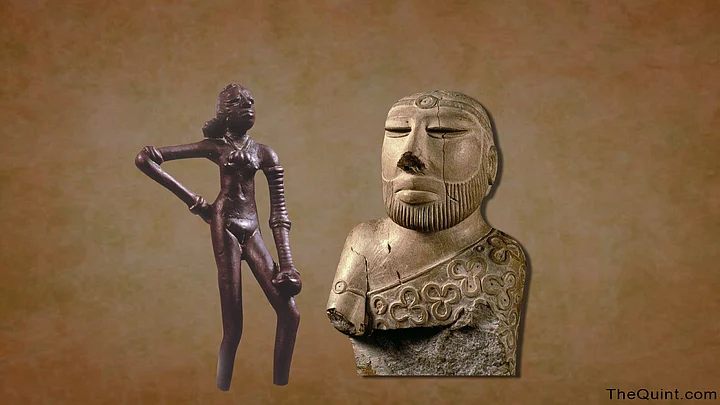Recently, I read the news about a petition filed in Lahore High Court by some Pakistan citizens regarding handing back the Harappan dancing figure found at the excavations at Mohenjo Daro in 1920s by archaeologists.
The petition is seeking the directive of the Hon'ble Lahore High Court to the Government of Pakistan to approach the Government of India for handing back this precious cultural object.
In the light of this development, I would like to clarify certain issues:
Harappan Civilisation Common to Both India-Pakistan
First, the Harappan culture (it is also referred to as Indus Culture) is spread over an area of roughly two million square metres in the north-west part of Indian sub-continent, which includes parts of Baluchistan, Sindh and Panjab in Pakistan and parts of Punjab, Haryana, Rajasthan, Gujarat and Maharashtra in India.
The Harappan civilisation is considered one of the oldest in the world, flourishing mostly in the Indian sub-continent, having trade interactions up to Central Asia, West Asia and Persian Gulf region.
The Harappan culture flourished from 5500 BC to 1500 BC. The most flourishing part of this culture is between 2600 to 2000 BC, which witnessed overall development and urbanisation.
The Harappan culture and civilisation is common to both India and Pakistan and is considered to be a shared heritage for both countries.
Common Heritage of South Asia
Before the partition in 1947 it was considered to be the common heritage of South Asia. We in India still believe that this is a common heritage of South Asia. No one particular country or community can claim the ownership of this civilisation. This is a civilisation belonging to humanity in general.
The iconic sites like Harappa and Mohenjo Daro are in Panjab and Sindh provinces in Pakistan. They were excavated during undivided India from the 1920s, interestingly by the Western Circle of the Archaeological Survey of India, the headquarters of which was located in Pune.
Sir John Marshal, the then Director General of Archaeological Survey of India, was the Director of the excavations at these two sites and under him were eminent scholars like RD Banerji, Madhav Swarup Vatsa, Earnest Macay, etc.
The first phase of the excavation under the direction of Sir John Marshal was completed in the late 1930s and the complete reports of the work was published subsequently.
Antiquities Shared After Partition
After the partition of the country, the antiquities recovered from these two sites were shared between India and Pakistan under an official agreement.
The two iconic artefacts, the dancing figure, on which claim has been made by a Pakistan citizen, was handed over to India and the figurine of the Chief Priest was handed over to Pakistan.
The remaining antiquities, which include pottery, painted pottery, ornaments of semi-precious stones, metal, terracotta, shell, ivory, stone and metal tools, animal bones etc. were shared between these two countries equally.
This agreement may have happened sometime in 1950s.
As it was an official treaty between two countries, there is no question of now demanding back a particular antiquity. The claim therefore has no standing at all.
Besides, these two sites were excavated before the partition and the antiquities of this site were also shared equally.
Discovery of New Sites
The initial research was carried out around the site of Harappa and Mohenjo Daro and a few more sites were discovered. It was believed then that the Harappan culture was confined to mostly the Sindh and Panjab provinces.
There were only two sites, namely Rangapur in Gujarat and Kotlanihang Khan in Panjab, left on the Indian side and the remaining known sites went to Pakistan after partition.
After partition, the Indian archaeologists, particularly Archaeological Survey of India, carried out an extensive survey along the border area in the north-west and western parts of the country and discovered a large number of sites belonging to the Harappan culture.
These sites have produced the same kind of cultural material as found at the sites of Harappa and Mohenjo Daro. Some of the important Harappan sites discovered on Indian side include Kalibangan, Lothal, Banawali, Dholavira, Rakhigarhi etc.
So far, more than 2000 sites of the Harappan culture have been discovered, of which 2/3 are located on Indian side. This indicates that the north-west and western parts of India were important for the Harappans. This particular culture also impacted the early farming communities in other parts of India. In spite of this, the Indian scholars do not claim the ownership of the Harappan Civilisation.
The Archaeological Survey of India is the right organisation to provide the necessary feedback and documentation in this respect. Prof BB Lal, the Doyen of Indian archaeology and the excavator of the site of Kalibangan, can shed more light on this particular issue.
(Professor Vasant Shinde is the Vice Chancellor of Deccan College, Post-Graduate and Research Institute, Pune)
